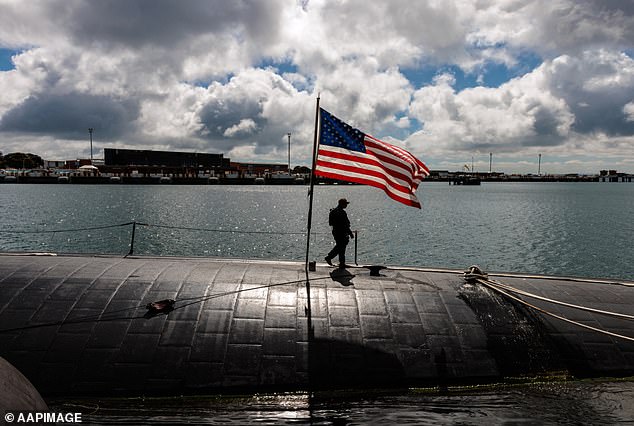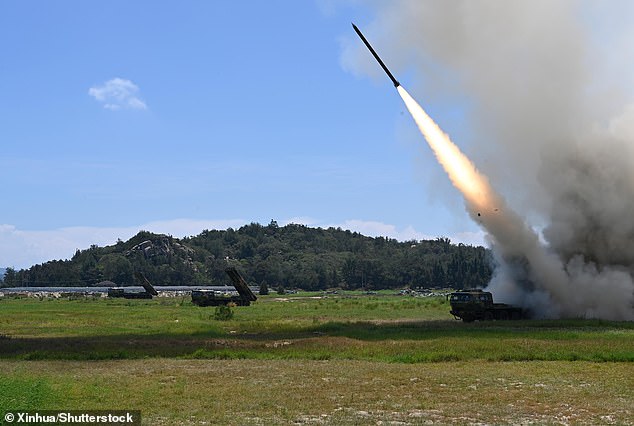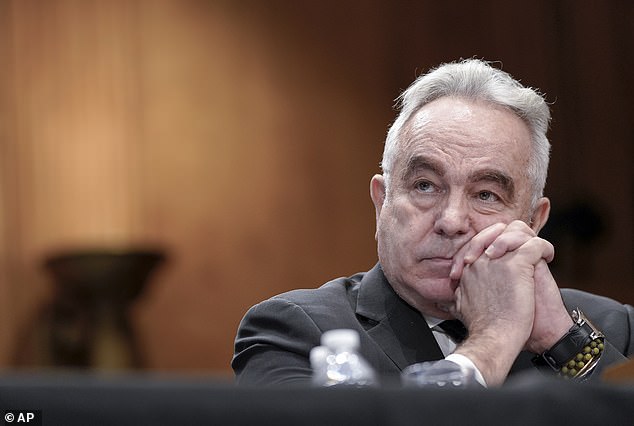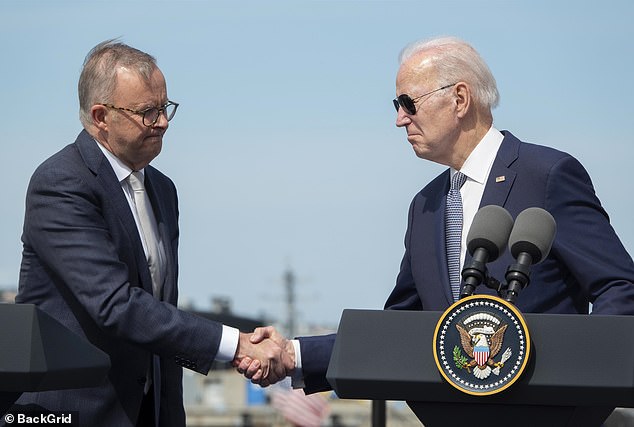A senior US diplomat has suggested his country would expect Australia’s planned nuclear-powered submarines to be used if it went to war with China over Taiwan.
Deputy Secretary of State Kurt Campbell spoke about the AUKUS submarines during an appearance last week at the Center for a New American Security in Washington.
Dr Campbell said the US was facing “a number of potential conflict areas” in the Indo-Pacific that would require the cooperation of its AUKUS allies and other regional partners.
The federal government has committed to building a fleet of British-designed nuclear-powered submarines in Adelaide under the trilateral AUKUS security programme.

A senior US diplomat has suggested his country would expect Australia’s planned nuclear-powered submarines to be used in a war with China over Taiwan. A US Los Angeles-class attack submarine pictured in Perth.
Prime Minister Anthony Albanese said in March last year that the plan, which included the purchase of at least three US submarines, would cost taxpayers between $268 billion and $368 billion over the next 30 years.
Albanese, US President Joe Biden and British Prime Minister Rishi Sunak have discussed the number of jobs that will be created in their countries under the alliance.
But in his comments last week, Dr. Campbell seemed to make clear that the United States viewed AUKUS as playing a role in any Taiwan Strait conflict with China.
“I think the practical circumstances where AUKUS has the potential to have submarines from multiple countries operating in close coordination could deliver conventional ordinance from long distances,” Dr Campbell said.
‘These have enormous implications in a variety of scenarios, including cross-strait circumstances…
“And so I think I would say that working closely with other nations, not only diplomatically, but also in the defense sphere, has the consequence of strengthening peace and stability more generally.”


Deputy Secretary of State Kurt Campbell says the United States faces “several potential areas of conflict” in the Indo-Pacific. The photo shows a Chinese missile fired in the Taiwan Strait.
Dr Campbell said Albanese, Biden and Sunak needed to “constantly underline” their support for AUKUS.
“I think every country, every one of these countries, needs to emphasize that this is not a jobs program, it’s not a technological development program,” he said in Washington.
‘Those are corollary advantages.
“This is a security partnership that is deeply constitutional and has the potential not only to create fundamentally new realities… on water in Asia, but also to change the nature of the way each of our three countries operate together “.
Albanese has consistently said that Australia would have sovereign control over the use of submarines if its interests were not aligned with those of the United States or the United Kingdom in times of war.
Dr Campbell reportedly told European Union officials two years ago that AUKUS intended to “get Australia off the fence – now we’ve got them locked in for the next 40 years”.


“I think those practical circumstances where AUKUS has the potential to have submarines from multiple countries operating in close coordination could deliver conventional ordinances from long distances,” Dr Campbell (pictured) said.
In June last year, Dr Campbell told the Center for International Strategic Studies how Australia was expected to deploy US-built submarines during a discussion on the strategic implications of AUKUS.
“I would also like to remind you that when the United States sends submarines to Australia, they are not lost,” Dr Campbell said.
“They will be deployed by the closest possible allied force.”
A leading Australian defense expert has previously said the AUKUS deal could lead to the nation being forced to follow the United States into a war against China.
Hugh White, former deputy secretary of the Department of Defense at the Australian National University, sharply criticized AUKUS in March last year, just days after details of the program were announced.
“This is a very serious transformation of the nature of our alliance with the United States,” Professor White told the ANU political podcast Democracy Sausage.
“The United States doesn’t really care about our submarine capability; it cares deeply about tying Australia to its containment strategy against China.”


Albanese (left), US President Joe Biden (right) and British Prime Minister Rishi Sunak have discussed the number of jobs that will be created in their countries thanks to the alliance.
Australia plans to purchase up to five US-made Virginia-class nuclear submarines as an interim measure before eight SSN-AUKUS submarines are built in Adelaide, with the first to be completed in 2042.
Professor White could not see why the United States would sell its own submarines – of which it has fewer than it needs – unless it was certain that Australia’s submarines would be available in the event of a major conflict in Asia.
He said a war between the United States and China over Taiwan would be “World War III” and would have a “very good chance” of escalating into a nuclear conflict.
“Australia’s war experience is shaped by the fact that we have tended to be on the winning side, but there is no reason to expect the United States to win in a war with China over Taiwan,” he warned.
He suggested there was also a high probability that the AUKUS deal would fail under a future US administration and a worsening strategic environment.
Professor White said there were cheaper, faster, less risky and less demanding ways for Australia to get the submarines it needed, calling the AUKUS plan a waste of money that “makes no sense”.
“There will be no real net increase in the number of available submarines until well into the 2040s, even if everything goes as planned, which it probably won’t,” he said.
